
From the parroting of Trump's racist "kung flu" rhetoric to a dramatic uptick of anti-Asian hate crimes like the Atlanta spa shootings, the past year has been an especially disturbing and daunting one for the Asian diaspora-at-large.
That said, the near-constant news about racially motivated attacks has also added another level of fear and alienation in an already-isolating time and has encouraged many of us to reckon with the ever-present undercurrent of racism and "Othering" we've faced, but never really spoke out on.
In light of this all, PAPER decided to talk to eight Asian artists — TOKiMONSTA, Lastlings, ZHU, Shawn Wasabi, QRION, Manila Killa, Giraffage, MILCK — about their thoughts on what's happening, their own personal experiences with racism and how they envision moving forward, among other things.
Read our Q&A roundtable with them, below.
Manila Killa
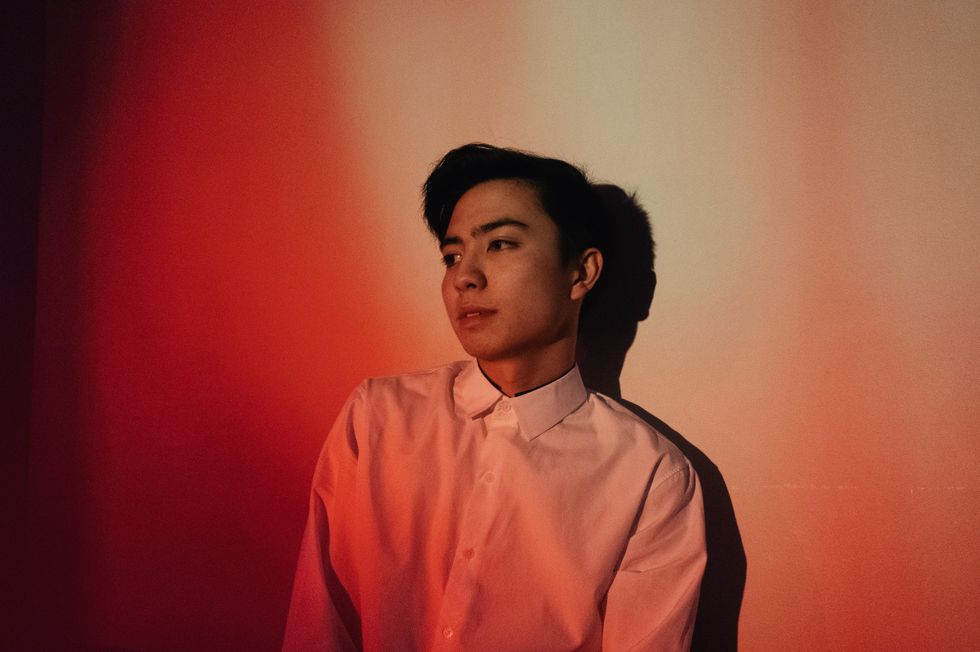
Photo courtesy of Angel Vera
For starters, how has the news surrounding the drastic uptick in anti-Asian hate crimes amid the pandemic affected you?
Qrion: It makes me sad and angry to hear that my people are becoming "targets." I knew that Asian hate and anti-Asian hate crimes have existed for a long time, but the combination of the COVID-19 pandemic and racism has made us easy targets during a vulnerable time for society. It's made it easy for racist people to blame us for the virus, violence and more.
MILCK: Personally, I have a heightened level of anxiety and uncertainty when I go to the grocery store, when I pick up food and when I get gasoline. I don't know if I am going to be around people who have harbored anger towards people who look like me or if I will be safe. It's an added sense of insecurity, as I already feel like I have to be on guard as a woman in public places. Especially when I am alone in public. I also have way less emotional bandwidth, so my circle of communication is way smaller, as I am being mindful of the energy I have.
Manila Killa: It's affected me in a way that leaves me feeling helpless, especially during a pandemic. I've spent the entirety of the last year indoors on my phone, watching videos of Asians being assaulted over and over. It makes me feel helpless and angry because I feel that there was nothing I could do to prevent these particular events from happening. Doom-scrolling comes to mind and that's something that I feel a lot of us have let affect us negatively.
Lastlings: It's been incredibly sad to watch these events unfold overseas. Racism is something we've experienced frequently whilst growing up, and it's especially scary and disturbing that anti-Asian hate crimes are becoming more prevalent. A lot of the stories being shared around social media have brought us to tears and it's been extremely confronting and heartbreaking to see something like the Atlanta spa shooting in the mainstream media and seeing those boys lose their mother.
ZHU: People have been hating Asian Americans for a long time, but when murders happen, anger follows. It hurts to see that the victims look like my mom.
MILCK: Privately, as I'm watching the news or going on social media, I'll face unexpected moments of sharp, grating pain as my screen fills with headlines of AAPI violence or videos of grandparents getting abused, or videos of my fellow Asian sisters getting killed or beaten by men. When I log onto Instagram, I don't know if I am going to see a violent video of another Asian sister getting beat up, or if I am going to see a funny meme. The moments of violence towards my mental health come as surprise visitors, so I am diligently practicing a lot more breath work and meditation to stay as grounded as I can. I am also spending much less time on social media or reading the news, and more time creating art right now.
Shawn Wasabi: It just makes me feel so uncertain especially now during the pandemic. I'm doing my best to keep my spiritual equilibrium, but it seems off. There were always things going on even before; however, I could always meditate and find peace. It's harder to balance it right now.
TOKiMONSTA: It's definitely taken a toll on my mental health. As a public figure, I find it's necessary to stay up to speed with what is happening to our community so I know how to best find solutions. However, constantly exposing myself to acts of harm and explicit violence has its repercussions. Then there's the matter of explaining the plight to those who have no idea or no sympathy for Asians due to false ideas and stereotypes of Asian success. It's exhausting.
ZHU
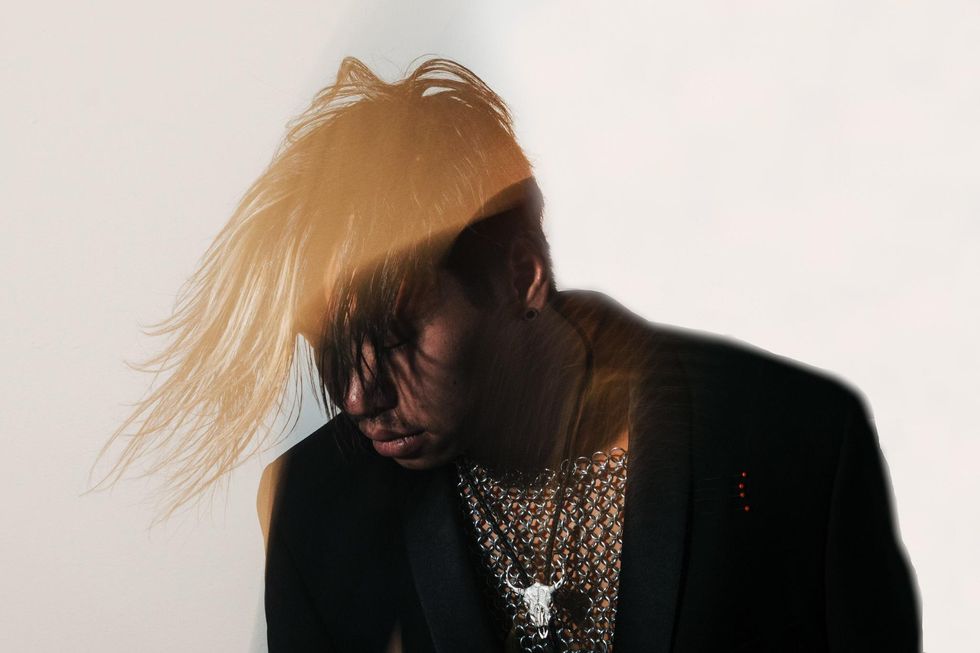
Photo courtesy of Joey Vitalari
On a personal level, was there a particular moment or experience in which you realized you were considered the "Other"?
ZHU: My whole life I have been the "Other." I'm not white enough to be accepted by the whites and not Chinese enough to be accepted by the Chinese. Who the fuck cares? I don't fucking care.
Giraffage: Growing up, I was one of the few Asian kids in my entire class. It is easy to be considered the "Other" when literally no one looks like you.
MILCK: I have known this my entire life, ever since I was in elementary school when kids would make fun of the food I brought to school. Or when kids would call me "Ching Chong" or make fun of my eye shape. Or when music managers told me to go "back" to China to pursue music, because American audiences would not feel compelled by an Asian artist. It's been my entire life.
Qrion: Some people look down on me because I'm Asian and some people get mad or frustrated with me because I speak in English with a very thick Japanese accent. There have been a few times that random people on the street [would yell "Ni Hao"].
TOKiMONSTA: I knew I was the other since I was in the first grade. A white boy in my class asked me if I was Chinese or Japanese. I told him that I was Korean, then he said there's no such thing and told me to say something in the language. I proceeded to say something in Korean and he immediately said I "made it up." At that point, I knew this was going to be a battle I'd face my entire life.
Shawn Wasabi: I remember various small moments and the microaggressions growing up. I would always find ways to chalk it up [to something else], but even then, I was a sensitive kid and would cry about the smallest thing. Growing up, I got bullied for being Asian. Actually, everybody got bullied to some point, [but] some of the kids would always find ways to make jokes and it would feel like they would get ready to punch you. I always avoided the situation, even when things became violent or luckily, I was fast enough to get away. It really messes with your heart.
Manila Killa: There were small moments growing up where I realized I wasn't viewed as the same as some of my peers. It roots back to as early as middle school, where after explaining that I had just moved to the US from Jakarta, I was approached by many asking if I needed to cross rivers to reach school, climb trees to enable wifi, and what kind of strange animals and bugs I must've eaten for lunch. I always gave people the benefit of the doubt and reassured them that this was not what it was like in a majority of the Asian countries abroad. I always brushed it off, but it stuck to me that no matter how you present yourself, some will still hold a predisposition about you based on race.
Josh Dowdle (Lastlings): I've had a few moments where I've felt ostracized from groups because of being half-Asian or my mother being Asian. My first day of high school I had no friends, because I was transferring from another city, and I walked up to try and make friends with a group, and one of the kids cut my arm with his ID card and said, "You're Asian," while everyone laughed at me. An earlier memory from primary school was when I went to speak to a girl I liked, and I asked her to go on a date or to hold my hand or something, and she said, "No, your mum looks weird." When I asked why, she said, "Because she's Asian." At that age, it's quite confusing to be told something like that, [because] your mum is your superhero. Why is she any different to everyone else's mum?
Amy Dowdle (Lastlings): My first experience of racism was at school. I was 7 years old. My Japanese friend and I were walking to the playground when two girls from our class came up to us. They slanted their eyes back and said "ching-chong China." They laughed and went on to call my friend and I "ugly" because we looked "different." In primary school, a girl came up to me and said, "Nobody thinks you are pretty because you have a flat Asian nose." Boys at school would turn me down because "They weren't into Asians" or because I was "an ugly Asian." I was even ignored by one boy during high school, because "he hated Asians."
The bullying and racism continued throughout my schooling. I went through a period of wanting to hide and neglect my Japanese side. I started to feel so self-conscious about my appearance that I wanted to dye my hair blonde and I would wear so much makeup during high school to make myself look "less Asian."
Josh Dowdle (Lastlings): I remember being so ashamed of being Japanese to a point where I would lie and say I wasn't, and I told my mum to stop making me Japanese lunches and that I wanted sandwiches. I didn't want sandwiches! I always wanted Japanese food for lunch, but I would always get teased for having seaweed and rice and that it "smelt bad." No one would sit with me if I ate a traditional bento lunch. It broke my heart when my mum was called into the school, because I wasn't eating my lunches and throwing them in the bin. It broke my heart because of how much time she would have spent to make them, and it's like throwing a little bit of your culture in the bin everyday.
Amy Dowdle (Lastlings): As I grew up I also started to experience the fetishization of Asian women. I worked at a sushi restaurant during high school when I was 16. I remember one night three men were sitting at the booth. My coworker and I were the only people that night working. One man said to his friend, "Look at this one over here." As if my coworker were objects. "I like my women Asian," he said to his friend. They began to watch me. I have had a man tell me at a club, "I have a thing for Asian girls, because of the noises they make in bed." And I have heard similar stories from a lot of my other Asian friends.
Qrion: People from my past who used to be friends asked if I can do whatever the person wants sexually, because I'm Asian and "we have to obey," which is a stereotype people have towards Asian women. Those experiences naturally made me think like okay I wasn't accepted as a same human.
Giraffage
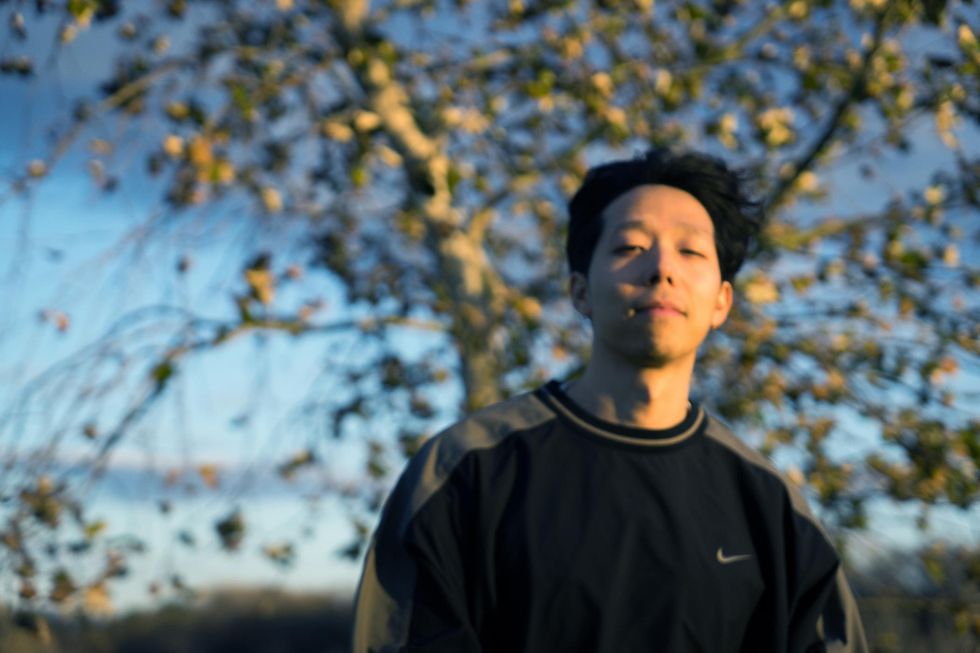
Photo courtesy of Giraffage
Even prior to the pandemic, anti-AAPI racism has always been latently present in some form or another, whether it be stereotypes or derogatory "jokes." How has the overt violence changed your approach to thinking, discussing, and tackling this issues?
TOKiMONSTA: I've experienced racism in many forms, but once you start seeing the scale at which these injustices have been silently internalized, you wonder why we never spoke out before. It has taken brazen acts of violence for us to realize these things are not okay and not deserved.
Manila Killa: The overt violence we've been seeing lately has made me feel more passionate about educating others on why anti-AAPI racism isn't something to be taken lightly, even as jokes. I've begun to learn and read about just how Asian Americans were treated in the 20th Century and how that's affected the AAPI population now.
Giraffage: I feel like every Asian-American has experienced having a kid run up to them and say "ching chong" or pull their eyes back, and the natural response to this in Asian culture is to just ignore and move on. But maybe the better response would be to confront these sorts of people and actually have a discussion with them.
Lastlings: Anti-AAPI jokes and stereotypes have been long present in our society whether it be in film, TV, art and even general conversation. It's unbelievable that it has only come to everyone's attention recently how bad Asian people — and especially Asian women — have been represented in Western media. It's truly disgusting to see how examples of stereotyping and racism in movies can shape people's behaviour towards Asian people. Our approach has changed simply by starting to speak about it. We've spoken to our mum about her accounts with racism over the years, and a lot of the time it ended with it's "shouganai" ["It can't be helped" in English]. We truly believe that it isn't "shouganai" anymore and that things truly need to change.
MILCK
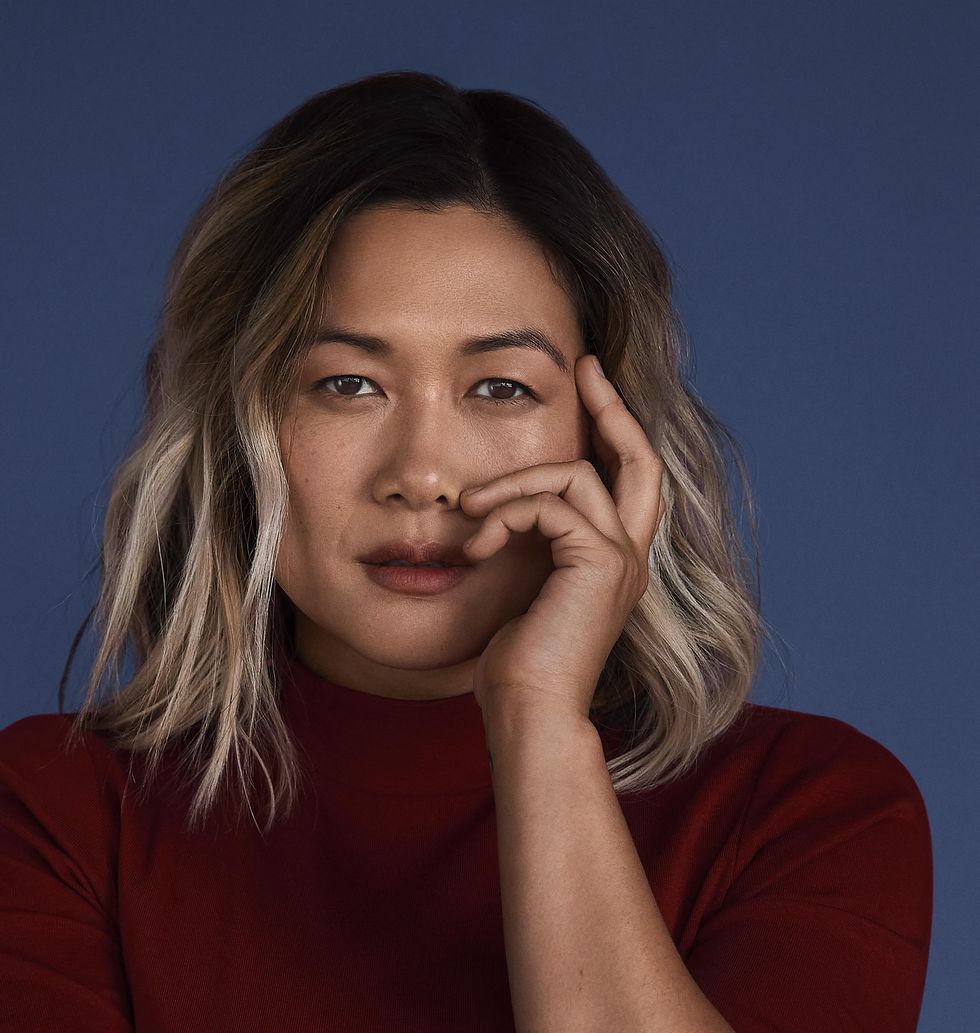
Photo courtesy of Eric Williams
Why do you think it took so long for people to become aware of these issues or even acknowledge that this was a huge problem?
TOKiMONSTA: Many, but not all, Asians are taught to be humble, not to burden others. To take care of ourselves and our families. My own mom tells me not to make a rukus about racism, because it may then make me a target.
Josh Dowdle (Lastlings): We have been in many situations where we have felt too scared or uncomfortable to stand up for ourselves when we have experienced racism. Like we mentioned [before], there have even been times where we just thought that it's the norm for people to behave that way. It really is sad that it has taken something like the tragic violent acts against Asian people to spark further conversation on this matter.
Manila Killa: It took people so long to be aware of these issues because Asians have always been seen as "model citizens." We're expected to stand back, be polite and not speak up, and that's caused many of us to stay quiet about issues. This roots from early childhood and has carried over generations until now.
Shawn Wasabi: There might be two sides to this. A lot of people see Asian-Americans as the invisible minority. It's the stereotype that since we all look alike as Asians, we're "all the same." On a surface level, people see Asian-Americans as foreigners constantly.
But even when I go on the internet, I notice the people in Japan don't care about this specific issue we're facing. They understand their country's politics, not America. In this political paradigm, there is a specific type of nurturing you're exposed to that you don't get if you grew up in Asia or if you're not Asian-American. You have to explain it to people before they understand.
Giraffage: Asian-Americans are invisible largely in part due to lack of media exposure and the "model minority" myth. It's like if a tree falls in a forest, will it make a sound? If no one talks about or sees Asians in the media, do we actually exist in the collective American subconscious? The idea of Asian-Americans being the "model minority" undermines the plight of Asian-Americans and ignores the reality in which Asian-Americans have to face.
QRION
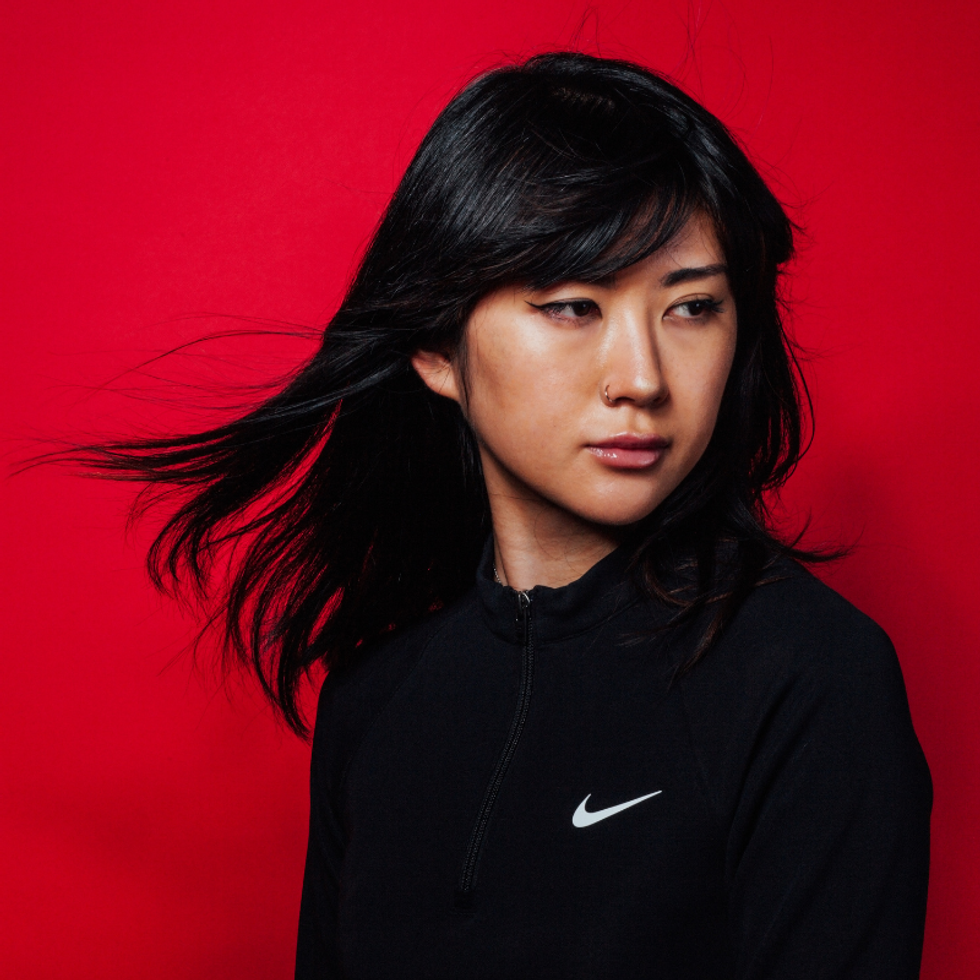
Photo courtesy of Julia Wang
What are your thoughts on the discussion surrounding the dichotomy between our designation as the "model minority" and the long-standing "yellow peril" rhetoric in the United States? How do you think this has played a part in what's going on right now?
Lastlings: When you read about the "Yellow Peril" rhetoric it feels so disturbing and too extreme to be real. I remember in school kids saying things like "yellow skin" or "Asian invasion," and even nowadays I hear people talk about "all the Asians taking our jobs." It vilifies Asian people and is a really dangerous and racist ideology. I think these comments and beliefs truly come from a place of ignorance, lack of education and stereotypes around Asian people.
Giraffage: The fact that anti-Asian violence has increased in the United States as a response to COVID-19 originating from China is proof that the "yellow peril" rhetoric never truly went away.
Manila Killa: The "yellow peril" rhetoric was a scare tactic in the US rooted in racism and fear that has resulted in many groups of Asians to be marginalized. It wasn't too long ago that Chinese-Americans in the Bay Area were blamed for 19th Century epidemics where, due to the lack of research on origins of specific viruses, lead to the "yellow peril" rhetoric being spread across the US. This event resulted with Chinese-Americans being denied healthcare and constructing their own Chinese hospitals to care for those turned away. The same type of rhetoric is being spread these days. I'm a firm believer that without education, history is doomed to repeat itself and we're seeing this happen now.
MILCK: To me, when we live in a society that reveres those who have more, it requires some humans to have less, so that those in power can maintain it. As a result, there is always going to be a moving target on what "tolerable" is. Dominant culture adapts its definitions of what is acceptable or unacceptable so that it can quickly and efficiently discard people as lesser than.
Giraffage: I think the dichotomy of ["yellow peril"] and the collectively internalized "model minority" myth adds a level of cognitive dissonance that makes it convenient for people to just ignore everything that is going on.
Shawn Wasabi: It's like comparing the rich Asian-American family to others and the concept that maybe they "don't experience racism" the same way. My family isn't rich, but ultimately everything comes down to one thing: White supremacy and how dominant white male supremacy is. The KKK wasn't built on class. They have wealthy and working-class members.
TOKiMONSTA: The "model minority" myth [has also] created a rift between other minorities and Asians. The perception of universal success among Asian-Americans is used to downplay racism's role in the persistent struggles of other minority groups, especially Black Americans. Society has a flawed comparison between Asian Americans and Black Americans. To argue that racism — including more than two centuries of Black enslavement — can be overcome by hard work and strong family values, it does not really work that way. The American system's argument is the idea that "Black failure" and "Asian success" cannot be explained by inequities and racism, and that they are one and the same. This allows a segment of white America to avoid any responsibility for addressing racism or the damage it continues to inflict.
Shawn Wasabi: White supremacy is trying to dictate our experiences and reinforce the dangerous hegemony of American classism. The whitewashing of Asian-American culture has created this perceived idea that members of the community don't experience racism in the same ways due to differences in economic standing, background and status. This is just another example of how the system of white supremacy needs to be dismantled in order for real change to occur, through activism, education and allyship.
Shawn Wasabi
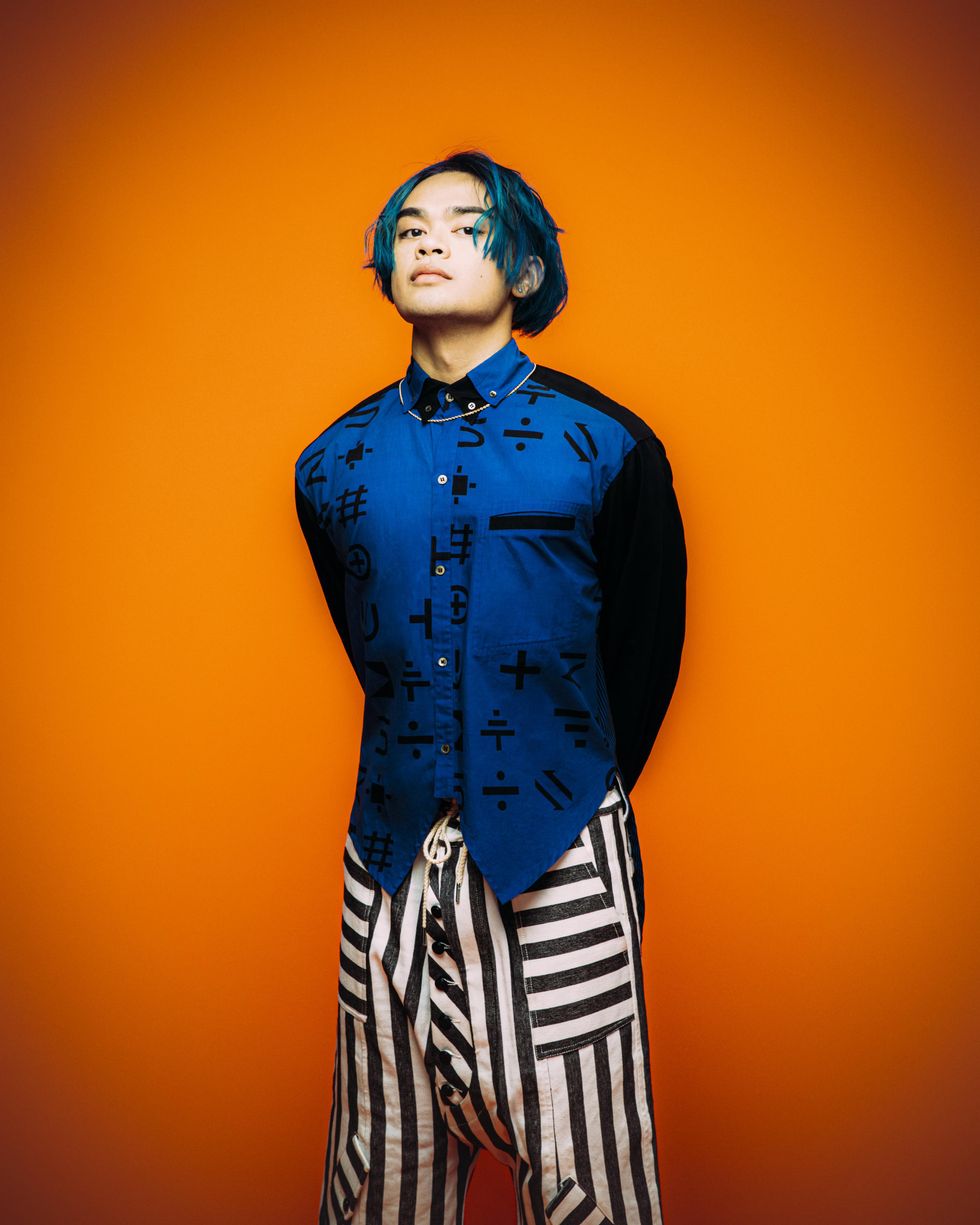
Photo courtesy of Nick Walker
Following the Atlanta spa shootings in particular, what are your thoughts on the stratification amongst members of the immigrant AAPI community, especially when it comes to things like colorism and classism, as well as the marginalization of sex workers? And how do you think we can work to help rectify these types of divisions?
Giraffage: Being visible and having conversations would be a start. It's pretty standard in Asian culture to sweep things under the rug and maintain the "out of sight, out of mind" mentality. But I think the way moving forward would be to confront the reality of the situation and have these sorts of difficult talks with the immigrant AAPI community. For instance, I've historically never went too deep on politics with my own immigrant parents, but recently I've been actively talking about these sorts of issues in an attempt to bring them to the forefront.
Manila Killa: Unfortunately, stratification amongst members of the immigrant AAPI community is something we will continue to struggle with for years to come. I grew up part of my life in the Philippines, a very conservative country that struggles with colorism and classism to the fullest extent. There is a desire to be fair-skinned, which represents wealth and cleanliness, and there is a disposition on dark-skinned Filipinos, which represents a lack of education and uncleanliness. Advertisements can be seen in every nook and cranny of the crowded city of Makati, trying to sell skincare products that claim to lighten your skin. The class divide in the Philippines is huge — gated communities share walls with slums — and there's a sense of individualism amongst the socially elite.
Sex work is something also still seen as taboo amongst Asians as many are conservative and aren't ready to have a conversation about it. Or they flat out reject it. These particular ideas spill over to the immigrants who have come to the United States, and I believe we can rectify these types of divisions by starting the education right at home. Having discussions about these topics with your family and peers and keeping an open mind about learning about these topics are valuable to society as a whole.
TOKiMONSTA: Even within the Asian community, there is a huge socioeconomic disparity between lighter skinned Asians and darker East Asians versus Southeast Asians. Even within Asian countries, they marginalize each other for one reason or another. This is not an easy solution to find. A simple first step is educating people and creating opportunities for new immigrants.
Lastlings: There's just such a disparity in how Asian people are perceived. On one hand someone will look at an Asian and assume they're a doctor or dentist and then on the other hand they are an illegal immigrant or a sex worker. It basically creates a "good Asian, bad Asian" stereotype and that, in and of itself, is dangerous by creating a stratification amongst the AAPI community.
Asian women are particularly prone to labour exploitation and abuse in the workplace especially Asian sex workers. It's particularly disturbing and a sad irony that Asian women are brought — a lot of the time trafficked — to countries to fulfill the enjoyment and needs of men and are then vilified, marginalized and subject to abuse. It's even more disturbing when these kinds of silenced or 'not talked about' issues have led to something like the Atlanta spa shootings.
Qrion: It was very hurtful news, knowing that the Atlanta police chief who said the shooter " just had a bad day" had also posted some very offensive pictures on his Facebook in the past is disappointing. Politicians and police want to be involved and help but they sometimes end up making these issues worse without realizing what they say holds power.
MILCK: The most pressing thing I will say is that gender violence plays a huge role in a majority of the attacks against AAPI. Over 60 percent of AAPI acts of violence are against women. The oversexualization of Asian women throughout our world's history, like during times of war overseas, needs to be acknowledged. For example, If people have not heard of comfort women, I suggest they do some research on that. Comfort women survivors to this day are still fighting for reparations and justice. These women are strong and admirable.
Furthermore, the assumption that Asian women are docile and quiet is harmful, because it's a simplification of a human being's complexity. Oversimplification of an entire group of people based on how they look and where they are from is dehumanizing. That act made it easier for Aaron Long to shoot the six Asian women, labeling them as temptations. They were so much more than somebody's temptation on somebody's bad day. They were somebody's mother, mentor, friend, or first call.
There is a big conversation of learning to respect and honor women, and it needs to happen within all communities- no matter what heritage one identifies with. For me, I know that even within the Asian community, a lot of the violence that is reported within the Asian community is Asian men committing violence against Asian women. We need our Asian men to speak out for Asian women, and to acknowledge the misogyny happening within our own communities. How can we protect our people if we cannot have peace within our own community? This does not take away from the conversation regarding the violence that is committed by non-Asians towards Asian women. It all matters. But the more holistically we can discuss a challenge, the more successful we can heal from root.
Lastlings
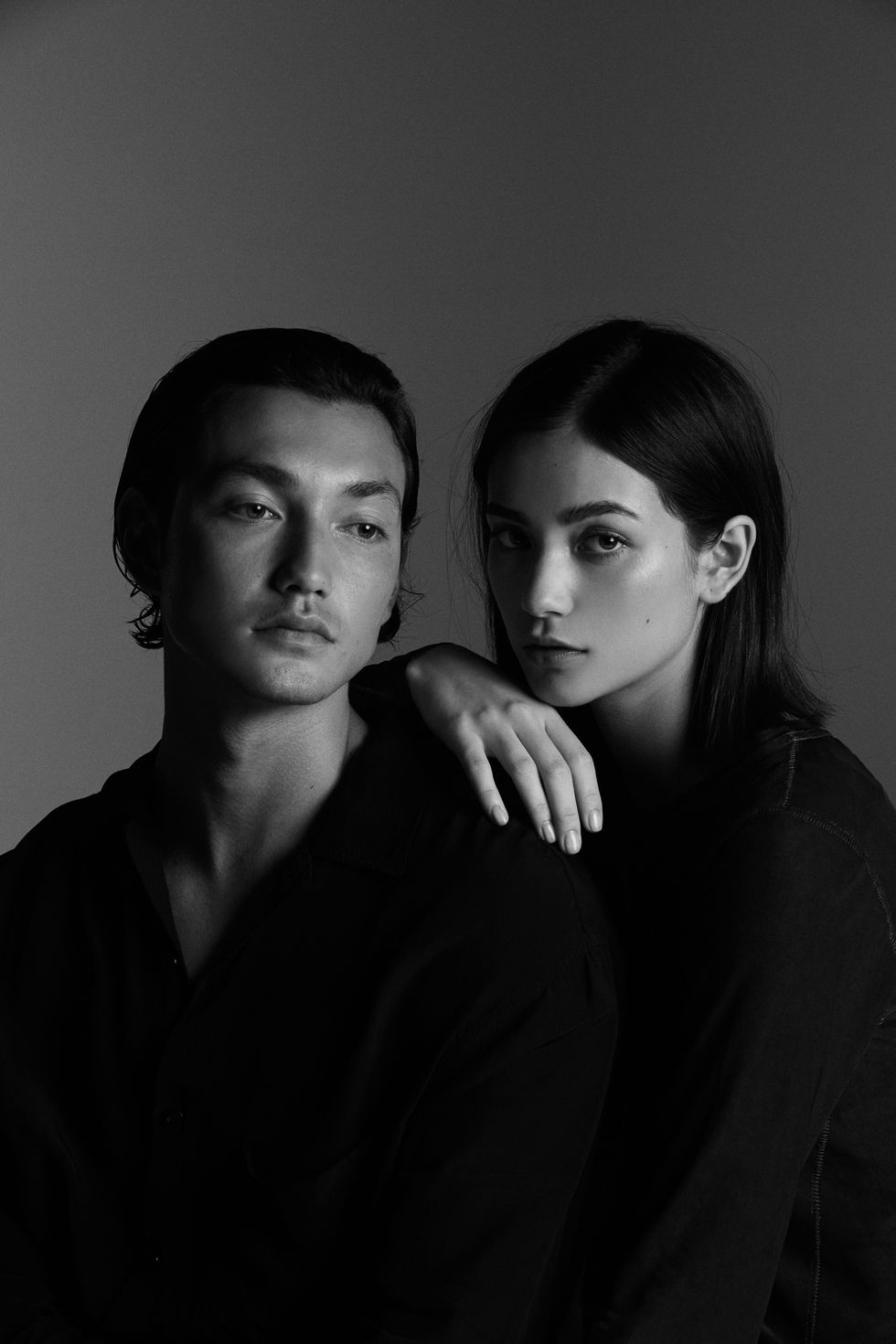
Photo courtesy of Jessica Leece
How do you envision us all moving forward?
ZHU: This young generation of Asian Americans are smart, passionate, driven and much more connected than their parents ever were. Most of all, they definitely understand their value and voice in this world.
Manila Killa: I have faith in how progressive the new generation of Asian-Americans are in shaping the future for us, and I hope that conversations regarding what it's like to be an AAPI in the US continues throughout our lives. Using tools like social media to push education have been important on a personal level, and marches and demonstrations raising awareness on these issues make a difference too. I hope that more Asian-Americans will band together and be proud of who they are, and are empathetic in reaching out to those affected by anti-Asian hate.
MILCK: There is a rise in conversation within the AAPI community like I have never seen before. This is our time to redefine what it means to be Asian American. On our terms. As we solidify as a community we must harness this energy to build bridges with other communities of color. We must educate ourselves on how this is not new, and this has happened before. We can learn from our ancestors, and continue collaborating with other communities of color. For example, right now there are many Asian and Black activists who are collaborating on the vision for Black reparations. Black activists played a key role in helping Japanese-Americans acquire reparations for being thrown into internment camps for three years, which took away their freedom and their property. Black communities and Japanese communities stood together to call for justice, which was crucial for healing. I see this now to be a time where the Asian community can rally in support of whatever Black reparations could look like. How inspiring is that?
Lastlings: In a perfect world, we envision moving forward together in unity and without racism — the dismantling of white supremacy and the solidification of equality through all races. It's beautiful how many people came together for the Black Lives Matter Movement and how many people are becoming allies and showing support for the AAPI community. It really inspires us and restores our faith in humanity when everyone can come together with a common goal of restoring people's basic human rights, giving voices to marginalized minorities and working towards ending racism.
TOKiMONSTA
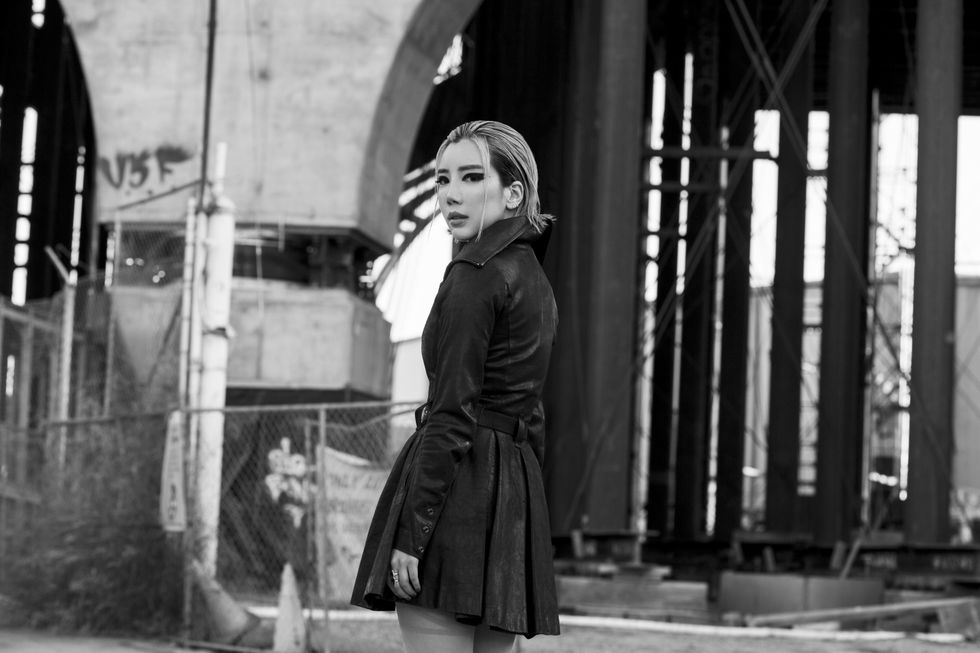
Photo courtesy of Nikko Lamere
How would you suggest your fans help combat anti-Asian violence and racism? Are there any particular groups, activists, or scholarship you'd recommend or have been inspired by?
ZHU: Try having personal relationships with Asian-Americans and you might start to realize that most of them have been in America just as long as you, and that they have never set foot in Wuhan. They don't do kung-fu or "kung-flu."
Qrion: I suggest spreading awareness. Sharing resources and donation links on their own social media or with their friends and family. Staying silent can be one of the most privileged things you can do. Seeing people who are obsessed with my country Japan and being super active on talking about how much they love our culture (anime, cartoons, games, fashion, etc.) and not speaking up about what is happening in our communities makes me question.
TOKiMONSTA: I think the number one thing people can do is educate themselves. Our community has aggregated some incredible resources on various websites to allow people to read, donate, and participate. Hate Is A Virus, AAPI Women Lead and the victim funds for those that have been hurt.
Lastlings: Call out and report racism. Whether it is verbal or an act committed with racist intentions. The second thing we would suggest is to talk to your Asian friends and POC friends. Learn about their culture. Listen to their stories and experiences of racism. If you have social media, try and bring awareness to what has been happening in the US and UK. Educate yourself on the history of anti-Asian racism and xenophobia.
Shawn Wasabi: People treat political activism like a meme and they shouldn't. You march in the streets, donate and it's "the topic" of the moment. But I don't want people to stop. Just keep checking on your friends, especially if they are Asian. Talk to your politicians and community leaders. Just keep doing the work. You can even continue to support my music too if you like it. [I suggest donating to] Asian-Americans Advancing Justice and StopAAPIHate.
Manila Killa: I hope that fans will stay vigilant and continue to call out anti-Asian racism on the street or on social media. I hope they feel a sense of pride in what they're doing by looking out for those who aren't able to defend themselves, and continue to stay on the lookout regarding ways they can help on an individual level. Every donation towards a group that empowers Asian Americans is a step in the right direction. An organization I was inspired by and have personally donated to is the National Asian Pacific American Women's Forum (NAPAWF), a group that elevates AAPI women to impact policy and drive systemic change in the USA.
MILCK: Visit somebodysbeloved.com, which has resources for anti-racist work and information on a fund I created to give energy and resources to seven racial justice organizations. This site was created after I wrote "Somebody's Beloved" to express love and support for Black Lives Matter, so we have added a page to address the AAPI experience. Special shout-out to one of our fund's beneficiaries, Freedom Inc., an organization that builds solidarity between South Asian and Black communities in Wisconsin. The work they are doing is the real deal. Check them out and give them all the love you can.
Amy Dowdle (Lastlings): Social Entrepreneur Amanda Nguyen has really inspired me to share my experiences of racism. I have been following her for a while now and really recommend having a look at her social media. She shares a lot of information on racism and the AAPI community. Some other Instagram accounts you can follow are @asiansformentalhealth, @jennyyangtv, @danieldaekim and @subtleasiantraits.
Quotes have been lightly edited for clarity.
Welcome to "Internet Explorer," a column by Sandra Song about everything Internet. From meme histories to joke format explainers to collections of some of Twitter's finest roasts, "Internet Explorer" is here to keep you up-to-date with the web's current obsessions — no matter how nonsensical or nihilistic.
From Your Site Articles
- Red Bull Doc Spotlights 88rising and Asia's Hip-Hop Movement ... ›
- Inside the "Protect Our Elders" Campaign Against Anti-Asian Violence ›
- How to Help Stop Hate Crimes Against Asian Americans - PAPER ›
- Daichi Yamamoto and Mick Jenkins Drop "Kill Me" Collab - PAPER ›
- Celebrate APAHM by Joining 'A Community Project' - PAPER ›
- Prosecutor Calls Atlanta Spa Shootings a Hate Crime - PAPER ›
- Exploring the Resilience of Asian Americans ›